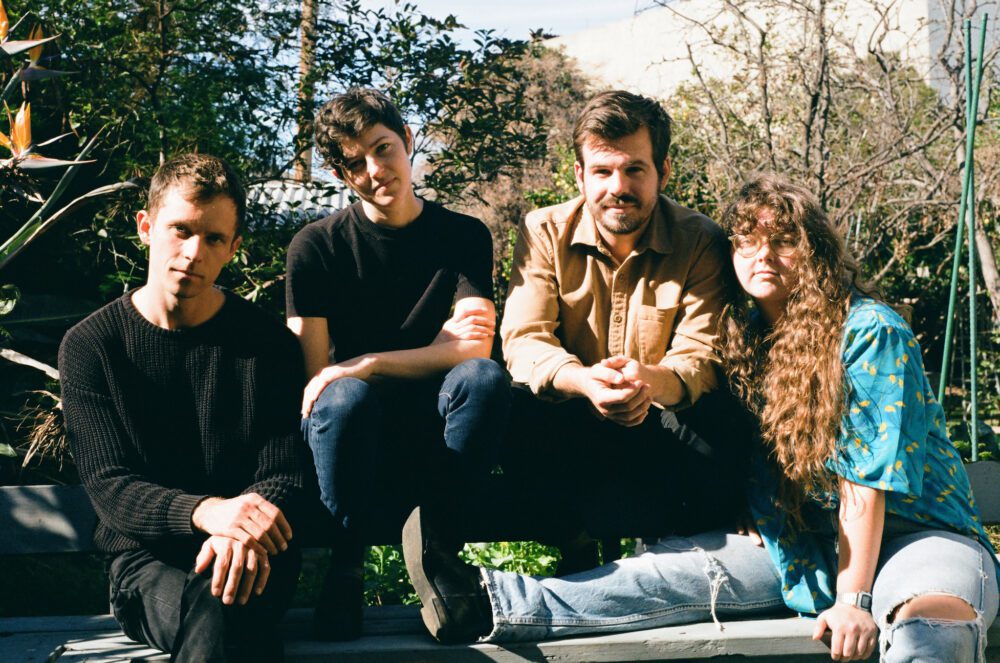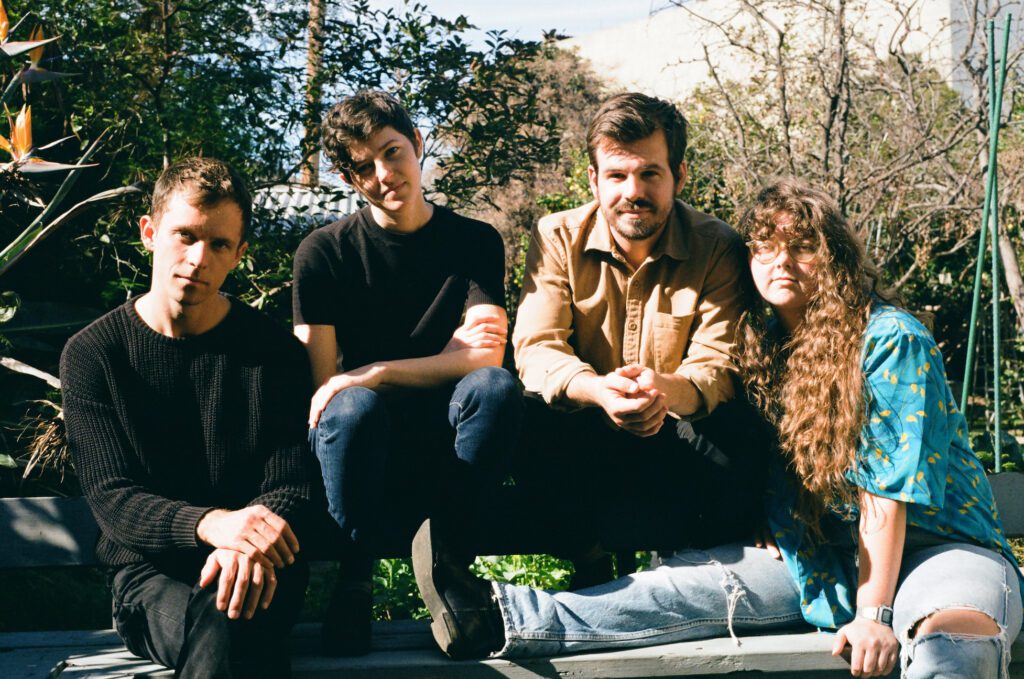

California-based experimental folk quartet Kidi Band doesn’t pull punches on their sophomore album So Good. Coming off the heels of 2016’s Gimme Gimme, the band’s new record takes their West African-inspired indie sound and cranks the volume up a notch.
Right from the first single “Mary (Merry),” lead vocalists Cari Stevens and Linnea Sablosky blow the door open on mysterious world full of shadows and light with their kinetic harmonies. The call and response between the two, alongside bandmates Steven Kai van Betten’s guitar and Cooper Wolken’s lower register, mix and melt on top of a cacophony of percussion. As the music narrows and the drums fade, a feeling close to religious fever takes over, voices echoing in a cathedral chamber, seeking a path to the heavens.
The four musicians initially met at a West African music class at Cal Arts in Santa Clarita. Van Betten wrote a song inspired the rhythms he was hearing in class. “It was an experiment to see if these rhythms that we were learning can integrate into a pop song format, to intentionally marry those two worlds together,” he explains. “We linked up and worked on this one song for a very, very long time.” That initial song, “After All Falls Down” from their first album Gimme Gimme, laid down a foundation for the band’s unique sound and set the standard for how they worked together.
“I think the studying of West African music, Ghanaian music, definitely had its strongest influence in the early stages of the band,” Wolken adds. “The instrumentation has been the longest holdover from that class, using this specific arrangement of percussion instruments and harmonized voices in the way that we do. It’s always been a part of the equation to have polyrhythms, which definitely draw a straight line from the study of that music.”
The name Kidi Band comes from a Ghanaian snare drum they used in class; originally the band stuck close to these traditional African instruments, and while they still use a shaker and bell, as time passed they have taken steps toward utilizing more Western sounds. “We just really want to be thoughtful. We know we’re all white people from America; we just so love the music that we got to study in college,” Stevens elaborates. “We’re inspired by it and I think step by step, as we’ve figured out more who we are as the four of us, it’s become more of our voice – still originating from that inspiration, but the further down the road we have gone, it’s been intentional not to take.”
“Imitation, integration, innovation” is a Kidi Band motto of sorts, and with their latest offering, So Good, the band leans into their own unique sound further, pushing themselves to write their own drum rhythms and patterns outside of the traditional Ghanaian ones they learned in school. The album’s through line is a playful sense of impending doom, a tickle of existential dread. While to a listener it may seem purposeful, the theme was organic in nature.
“It’s interesting to think about the way that the lyrics of the different songs bounce off of each other,” Stevens says, ruminating on a master doc Sablosky had recently made of all the lyrics. “A lot of these songs don’t have any lyrics. So they’re almost a little vague, but when you pit it next to this song that’s very specific it kind of colors the minimalism of the other songs, which makes them fit together in kind of an existential way.”
Take, for instance, the robotic staccato of questions posed on “Free Will”: “Why do I do what I do when I do it/Why do I choose what I choose when I choose it/Am I in control of my body and mind/Or am I just false identifying?/Where is the origin of thought/If not from I, then where and why/As hard as I try I cannot say that I know my own mind/So does this mean that I am just a puppet on a string/Governed by my past experiences and biology.” Van Betten wrote the lyrics before the melody on this single, a change of habit from the intricate soundscapes he normally brings to the table. The single, while appearing midway through the album, is a touchstone of sorts; once heard, it reverberates across the rest of the music, adding a darker tone to even the lightest of songs.
“Writing a song for Kidi Band is especially fun because we often joke that Cari and Linnea are singing machines,” Wolken said with a laugh. “They can do crazy hard things. So knowing that when you’re writing a song, you can say, ‘Oh in this section I want a part that sounds like a computer could do it’ – and then they just do it. It’s like a superpower.”
It’s true that the pair are often conjoined musically, two echoes of a whole. On many of the songs throughout the album – “50/50,” So Good,” “Under The Blue Sky” to name a few – their sound mirrors early Beatles albums, where John and Paul’s voices are almost indistinguishable from one another. It makes solos stand out, especially the rich timber of Wolken’s voice, which normally supports their upper register.
“The lyrics themselves we write individually,” Sablosky explains. “So one of us would come to the group with a skeleton of a song and it would have most of the lyrics, if not all of the lyrics already. And the rest of us would help arrange it.” Because all four artists know the songs will be taken apart and put back together as a group, they write with that knowledge from start, thinking at the time of composition: How will this be sung by Linnea and Cari? What part will Cooper take? Is there enough space left for Steven’s guitar?
It’s a communal process that is second nature to them now, with each person (other than van Betten) shifting instruments on any given song. “There’s a kind of flexibility, a connective progression of the way that we’ve built the songs and orchestrated them together, which I think creates and lends itself to that organic sensibility that you’re feeling as a listener,” Stevens says. “So it’s less that we brought them in and were like ‘Let’s make these work together’ and more that we didn’t have to think about making them work together because that’s just how we make songs as a band.”
“I looked out across the sea, asking what it has in store for me/Questions that I ask perpetually are answers in themselves,” goes the freewheeling loop on “Across The Sea,” a song that Stevens brought to the table. She wrote it while thinking about life after college, the wide expanse outside her dormitory walls. It’s tenderly arranged, with each of her bandmates taking a turn at leading the loop, offering a glimpse at each performer’s individuality, a little taste of what each person’s tones are like without one another.
The band recorded So Good in October 2017, but only recently felt the timing was right to release it. The recording has a certain kind of ethos – the idea that music can be made without ego, that music can be made with a solid baseline and four artists reverberating off each other in time. “Anybody or everybody could be singing at any time, everybody’s gonna share the responsibility of creating the groove,” Wolken says, describing the Kidi Band writing process. “It’s nice that it takes less – it can just have an idea for a verse or a melody and it goes through the Kidi Band filter and becomes something much better than anticipated.”
The band is currently making music individually, since COVID doesn’t allow for the kind of intimacy needed for the project as a whole. In the meantime, focusing on So Good has given them some hope for performing again in the near future. They step forward together, with reverence for where the music comes from and the people who taught it to them – and with a sense of daring and the confidence of people who’ve found their groove.
Follow Kidi Band on Facebook and Instagram for ongoing updates.

